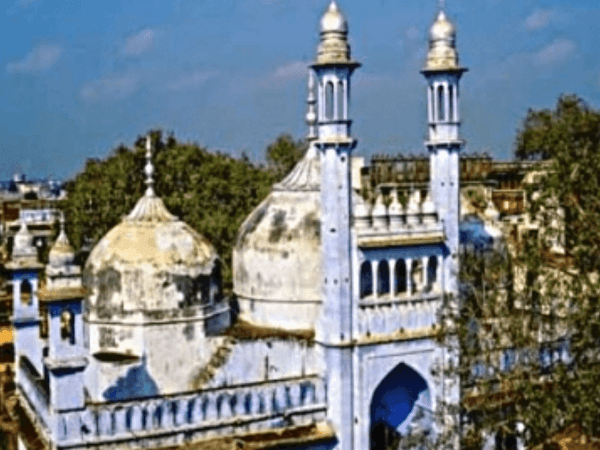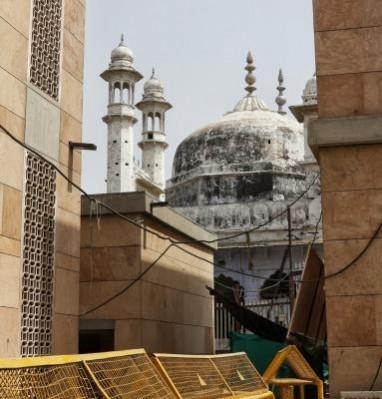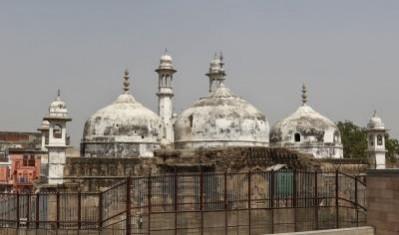More than three decades after the Gyanvapi row hit the headlines, a peaceful solution amicable to both communities continues to evade. However, legal intervention and efforts continue. On Thursday, the Allahabad High Court ruled that the ASI survey on the Gyanvapi mosque in Varanasi will not harm anyone, dismissing the plea that the survey will cause damage to the structure.
Chief Justice Pritinkar Diwakar, said, "The survey is required to do justice. Survey needs to be done with few conditions. Do survey, but without dredging?"

The Anjuman Mosque Committee, which manages the Gyanvapi mosque, apprehended that the historic structure might fall during the ASI survey to which the ASI said that the structure of the mosque will not be compromised as radar mapping will be done.
On July 21, a Varanasi Court had directed the ASI to go ahead with the survey to determine if the mosque was built at a place where a temple existed earlier. The court also allowed excavations as part of the survey, wherever necessary.
After the survey started on July 24, however, within a few hours after the mosque committee approached the Supreme Court, the process was halted. The SC intervened and halted the process allowing time for the committee to appeal against the Varanasi District Court's order.
Year 1991
In October 1991, a year before Babri Masjid demolition, a group of priests in Varanasi petitioned before the courts, seeking permission to worship on the Gyanvapi mosque premises. Devotees in the name of deity Lord Vishweshwar claimed that the mosque was built at the site of a temple that was demolished in 1669 on the orders of Mughal emperor Aurangzeb.
Enter five women priests and litigation gains momentum
The row involving Gyanvapi mosque, which is located adjacent to the Kashi Vishwanath Temple in Varanasi, again gained traction in 2022, after five women petitioners sought court's permission to offer prayers at a "Shringar Gauri Sthal" on the outside wall of the mosque complex. The issue has shuttled courts (from a magistrate court to a district court to Allahabad High Court and the Apex Court). The Hindu side contends that the mosque was built on the site of a temple, while the Muslim side claims that the mosque was built on Wakf premises, and Places of Worship Act bars changing the character of the mosque.
Varanasi Court rejects carbon dating
In October of 2022, a Varanasi Court rejected the petition seeking carbon dating of the purported Shivling found in the Gyanvapi mosque complex, asking whether a scientific investigation can actually be ordered. The petitioners claimed that the Shivling found in the 'wuzu khana' of the mosque during survey work on May 16 was part of the property. The Gyanvapi Masjid Committee had opposed the carbon dating, arguing that the case was about worshiping at a shrine inside the mosque and had nothing to do with its structure.

Shivling or fountain?
The petitioners approached the HC after the Varanasi Court rejected the plea for carbon dating of the Shivling, found during videographic survey on October 14, 2022. At the heart of the issue is the religious sentiments and also political agendas. While the Hindu worshippers have been calling the structure in question a Shivling, the Anjuman Intezamia Masjid Committee has been claiming it to be a fountain.
Allahabad High Court slams ASI
In April of 2023, the Allahabad High Court slammed the Archaeological Survey of India (ASI) Director General (DG) V. Vidyavathi on the failure to file a reply, as to whether a safe evaluation of the age of Shivling-like structure is possible. Calling ASI lethargic, the High Court observed, "A high authority holding the post of DG, Archaeological Survey of India...must know the seriousness of the matter and ought to respect the orders of the court."
Seal the area, no restrictions on namaz: Supreme Court
In November of 2022, the Supreme Court, said the area within Gyanvapi mosque where the "Shivling" has been found needs to be protected, but there should be no restriction on Muslims entering the mosque or offering namaz.

All India Muslim Personal Law Board reacts
All India Muslim Personal Law Board (AIMPLB) reacted sharply to the Gyanvapi masjid survey and the sealing of "wuzu khana" (ablution area). Condemning the survey and its report, the board termed the sealing of the ablution area as, "gross injustice to Muslims." In a statement issued on the day of the survey's report, the board said, "Gyanvapi was a mosque and will continue to remain a mosque till the end. The attempt to turn it into a temple is nothing more than a conspiracy to spread hate by communal forces."
The big question, the legal dispute
The Anjuman Intezamia Masjid Committee moved the SC, petitioning that the proceedings were an attempt to change the religious character of the mosque. The Places of Worship (Special Provisions) Act, 1991, bars conversion of the religious character of a place of worship, from how it existed on August 15, 1947. The only exception to the law being Ramjanambhoomi-Babri Masjid complex. Highlighting the complex nature of the case, in May of 2022, the SC transferred the case from a civil judge to the district judge. Central to the issue is the question of law, whether The Places of Worship Act, 1991, bars the Hindu litigants from approaching the court for their right to worship a deity situated within the mosque complex.
Politics at play
On social media and in communally provocative speeches, the matter never died down. In 2022, the Delhi Police arrested a DU professor Ratan Lal for posting derogatory and provocative content on social media. Regardless of the final judgment, however many hearings and appeals away it may be, political analysts predict Gyanvapi Row to be a big agenda during Lok Sabha elections 2024.

















